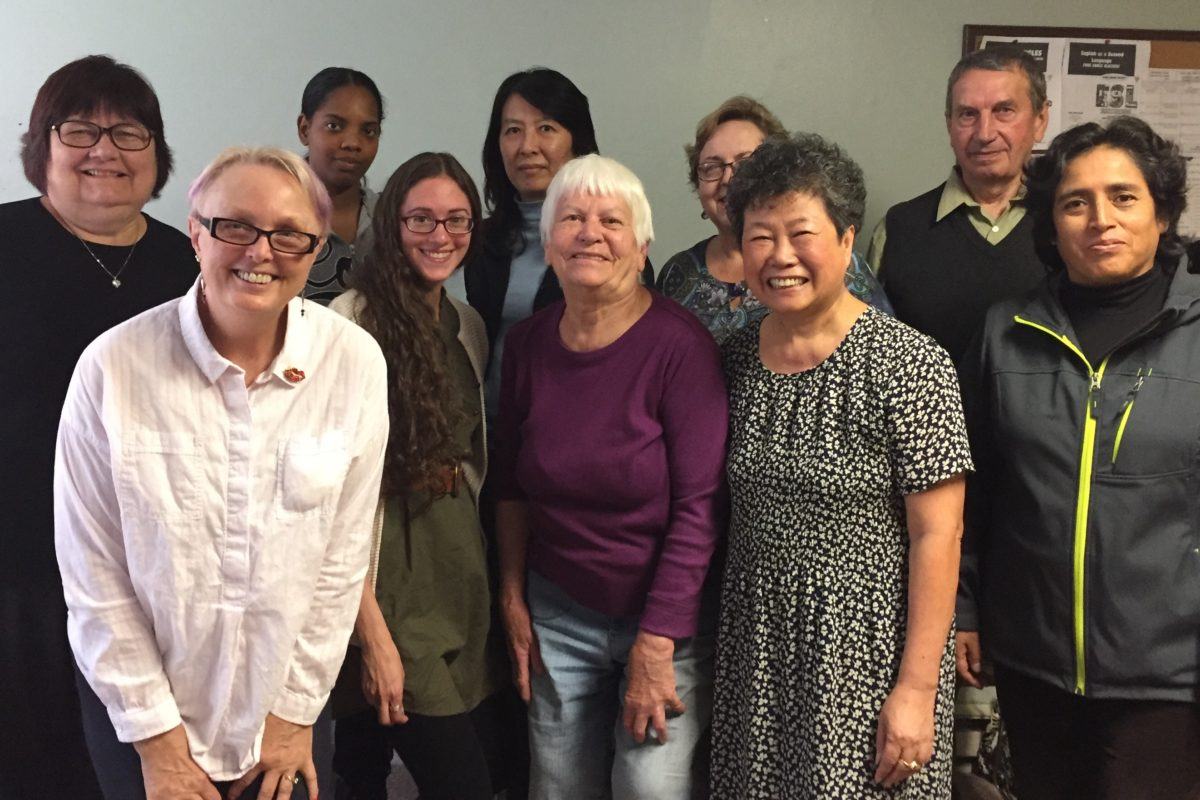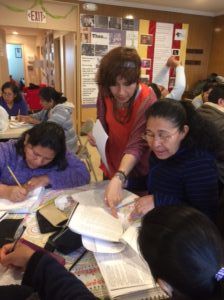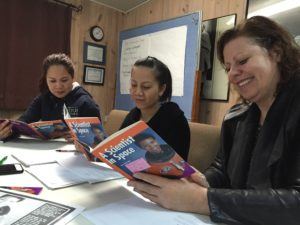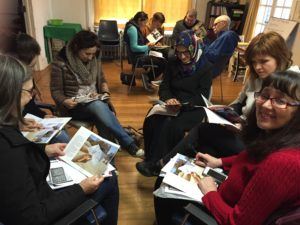
Mary’s Pence walks side by side with “las Marias” of the world – the women who persist and change oppressive systems at home and abroad. We support immigrant women and their families because the Mary’s Pence circle only grows stronger with their presence, activism and grit. In fall 2016, we welcomed two new grantees that provide holistic support for immigrant communities. Centro de Recursos Educativos para Adultos (CREA), founded in 2013 by Latina women of East Harlem, NYC, is a space of learning and connection for Latinx immigrants, offering general education and life skills classes in English and Spanish. Since 1999, Welcoming the Stranger has provided programs in ESL, computer skills, and citizenship test prep to immigrant communities in Philadelphia, PA. Beyond the classroom, the two organizations capitalize on a crucial part of all learning – that we are a humankind of immigrants, strangers to others until we enter their lives and are welcomed in response.
CREAting opportunities for the community, by the community

The voice of Maria Guadalupe Martinez, one of the founders of CREA, beams with pride whenever she talks about student participants of the Center: “I love it when they are learning, changing their minds. When they say ‘I want to study, I want to learn more’. You see their faces light up as they get more active, more involved.” Maria knows how important it is for recent immigrants to find peer support. CREA has over a hundred participants, hailing from Mexico, Dominican Republic, Ecuador, Puerto Rico, and Guatemala.
Classes at CREA are offered primarily in Spanish, to serve those who didn’t have the opportunity to pursue education in their home countries. “Many of them lived in small towns and villages where work begins at an early age, and few people get to go to school. Some are from remote indigenous communities,” Maria says, “People ask us ‘why don’t you teach in English more?’ But our students have to learn the concepts first in Spanish. People who don’t have that knowledge drop out of English classes, but we want to give them all the tools to be successful.”
About 80% of CREA participants are women. At CREA, they directly confront some of the cultural stereotypes that hinder Latina women from achieving their educational goals. “In Central America, there’s a spirit of machismo” – says Maria – “There’s a perception that women don’t need to study, that they must only clean, cook, and take care of the house while the men work in the fields.” But women have the dominant voice in the student body and the teaching staff at CREA. Interns from Mexico’s Universidad Euroamericana, primarily young women who intend to teach professionally, come and work in NYC for the duration of their social service year. Maria affirms the power of feminine collaborative spaces: “CREA provides more than just the classes – we organize workshops about migration, protection, what to do when emergency situations happen, how to remain calm in the times of stress. And we collaborate, we come together.”

CREA’s courses in Spanish are certified by Mexico’s National Institute for Adult Education (NIAE). Class participants often don’t have sufficient documents to prove their identity, and a CREA certificate can be a life-saving path for families to obtain passports or open bank accounts. Having an official educational document helps people feel more confident about their skills and their futures. Maria speaks to that: “When the students finish their course of study, when they have the diploma and the recognition, when they can say ‘I did it. It was my effort and time,’ their self-esteem increases. They start believing in themselves.’
Welcoming the Stranger, Welcoming Stronger Local Communities
“We have grown over the years” – says Executive Director of Welcoming the Stranger, Meg Eubank. “Prior to 1999, Philadelphia suburbs had no ESL classes, and we started out with 8 students. Now we have grown to 305.” Welcoming the Stranger has also expanded its programs from the original ESL and computer skills classes to include sessions on peace building and cultural exchange. And there’s an ‘unofficial’ part of the classes – conversations about body language, social norms, and U.S. communication styles, says Meg.
Welcoming the Stranger is sensitive to participants’ needs. Depending on the semester, 75-80% of the participants are women, most have settled in the U.S. with their families. “The women form support groups for one another. If they have kids in school, we can advise them on how to call in sick, for instance. Or how to navigate the school system and how to do parent-teacher conferences,” says Meg. The Mary’s Pence grant especially goes toward a class for mothers who have children with special needs: “We help those mothers understand the IEP, the protocol for requesting accommodations, and we break down the terms in the legal documents, making sure they know which questions to ask.”

Refugees and immigrants from over 100 different countries enroll in classes at Welcoming the Stranger. They come from India, Mexico, Turkey, Vietnam, Kazakhstan, Lithuania, Ukraine, Belarus, other Eastern European countries. Partners from local hospitals, parishes, and nonprofits, as well as about 75 volunteers, build relationships with the participants and learn from their diverse experiences, too. “When I go to work every day, I feel like I’m being with family,” saysMeg, “Community at Welcoming the Stranger is unique.” There is no official graduation from classes at Welcoming the Stranger. “Participants choose to leave when they feel like they’ve learned and it’s time for them to move on,” says Meg – “But they also stick around and come back for class even if they are already advanced, to stay with the community of their classmates.”

Welcoming the Stranger community is also learning to defend itself in the face of the rising hate crimes in the region and throughout the country. “It is important to become involved in your government locally, on the state level, talking to politicians about issues that concern you and your neighborhoods,” says Meg about possible ways to take action and advocate for immigrants and refugees. “Hate is not acceptable in our community,” asserts Meg. We at Mary’s Pence stand in solidarity with her sentiment, always committed to accompanying “las Marias” of the world.
– Svitlana Iukhymovych, St. Joseph Worker
Maria Guadalupe Martinez, one of the founders of CREA, passes on a call to action: “We would like to ask you for old laptops and computers. If you have any that you don’t need – please donate them to us. If our students know how to use a computer, they become more confident, they want to continue to study.” While the New Yorkers have proven to be friendly towards immigrants, the City of New York has offered Maria and the Center no financial support. CREA thrives on donations from the community.
If you have an old laptop that you no longer need, contact CREA[email protected] – or visit CREAny.org
